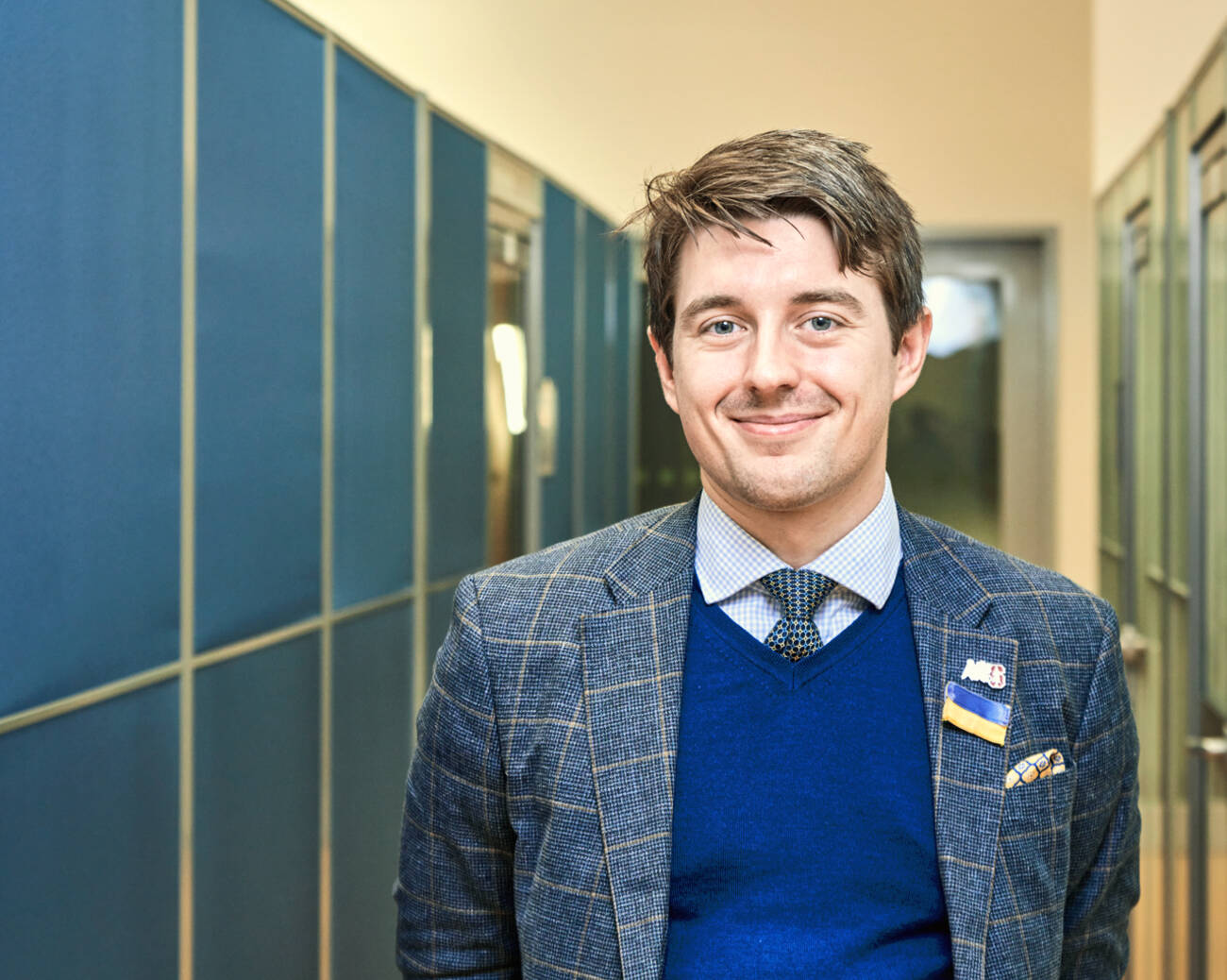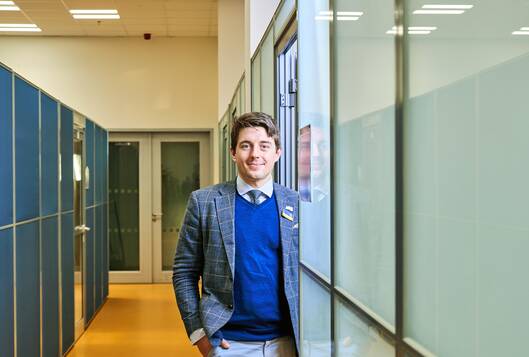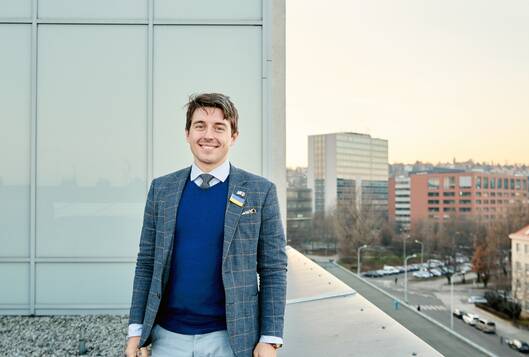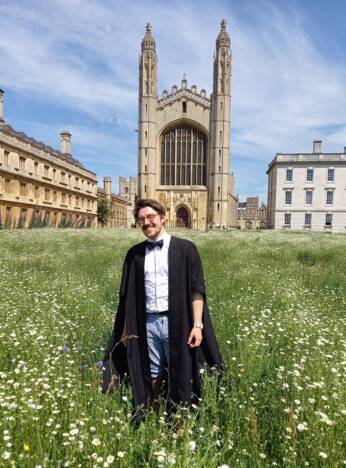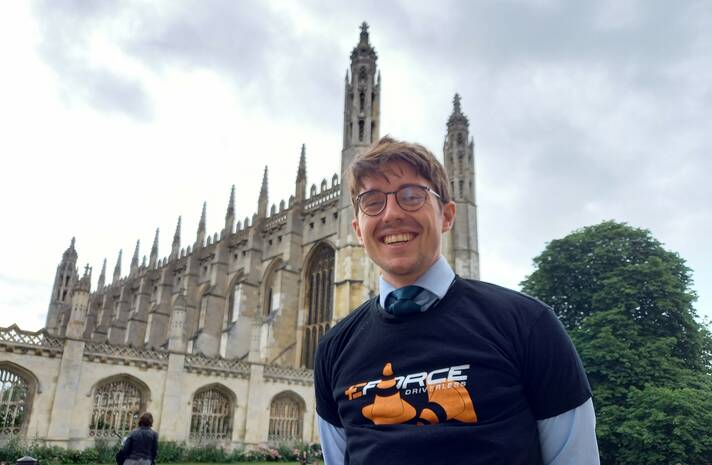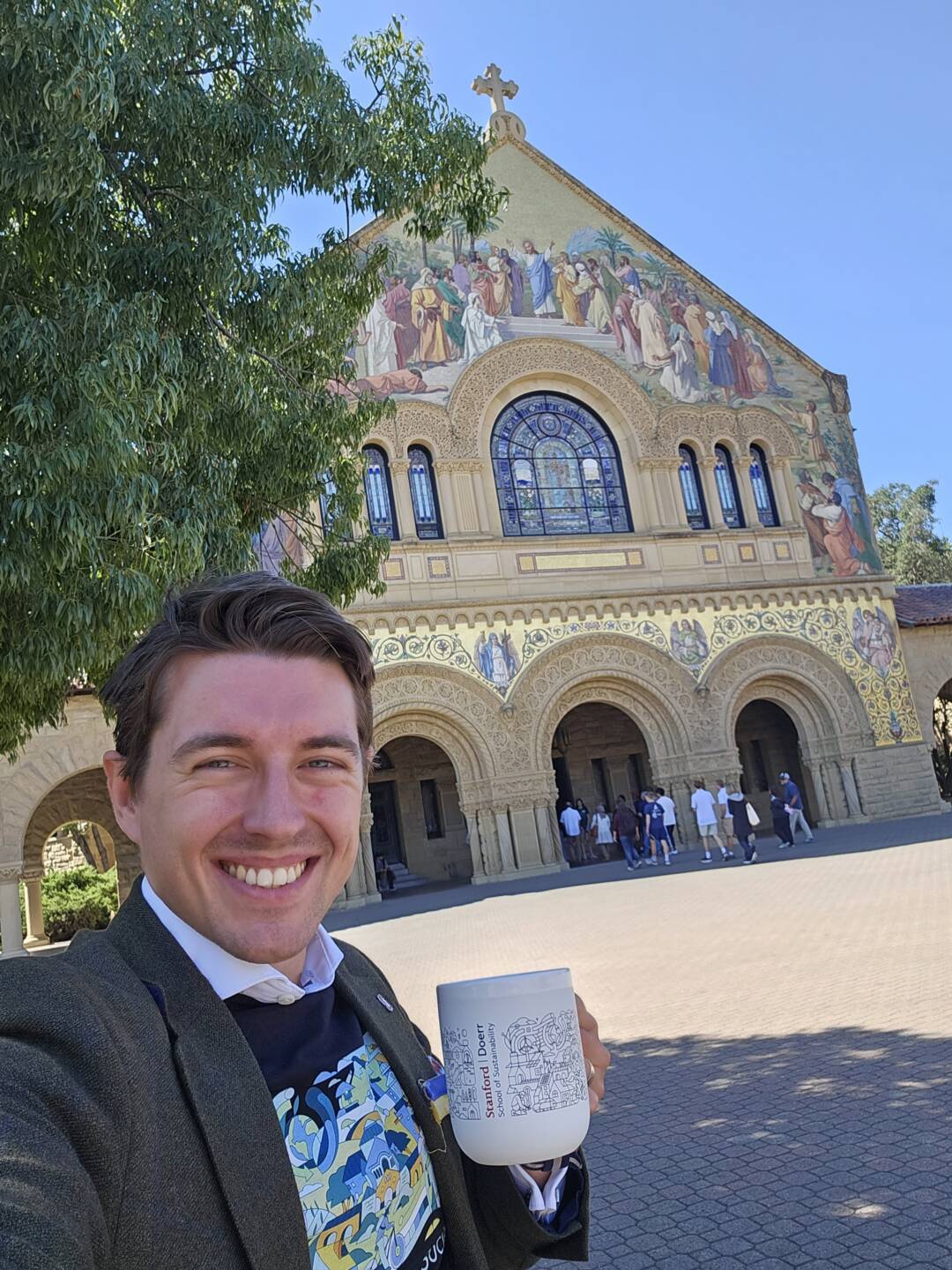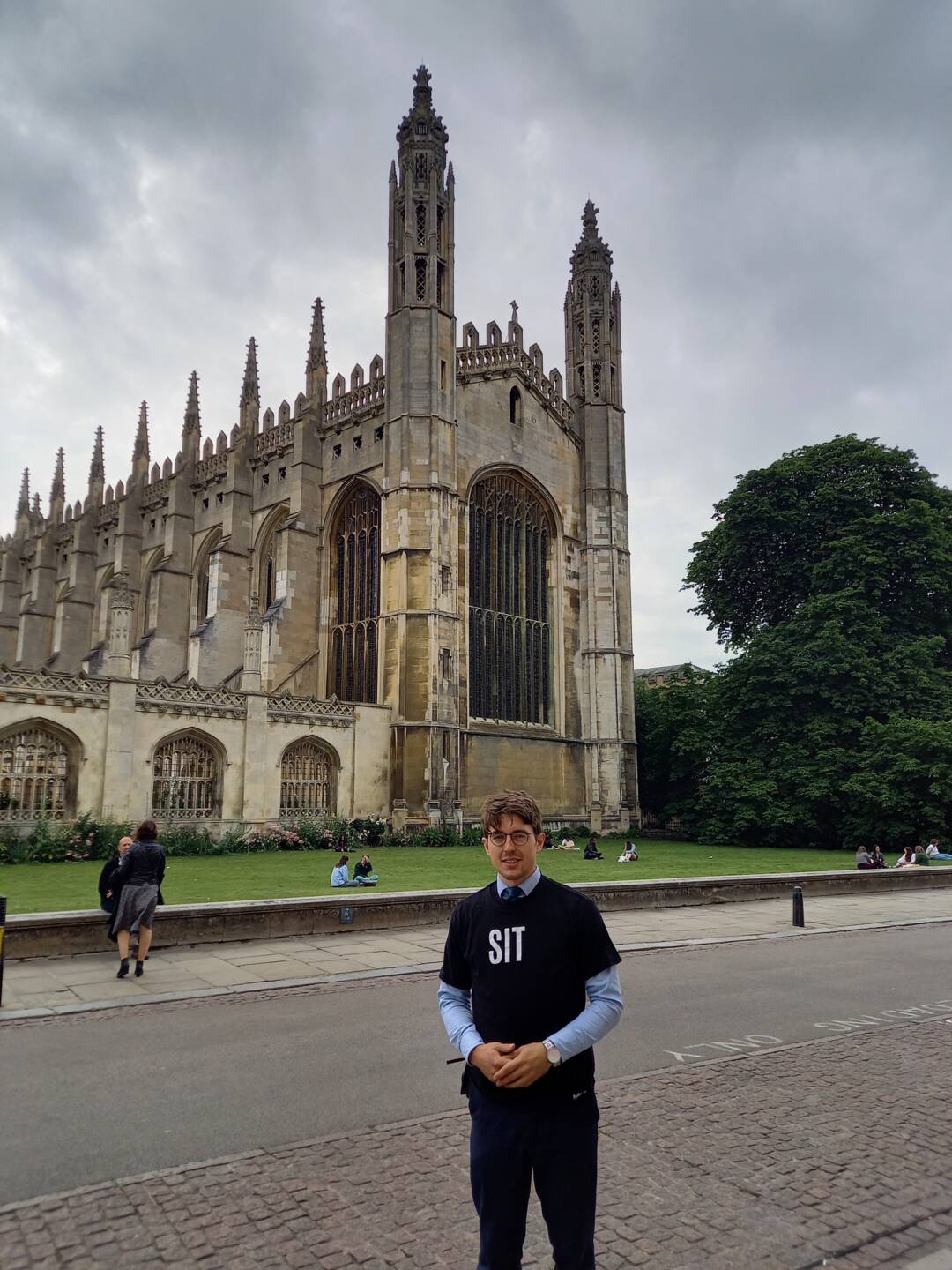What was your journey to the Faculty of Electrical Engineering (FEE) and why did you decide to study at this faculty?
I came to FEE from the Jan Neruda Grammar School in Prague. I was active in various political simulations of how the UN or the US Congress works, so many people expected me to study politics or law. However, because of my interest in mathematics and with employment prospects in mind, I was deciding between computer science at FEE and economics at Charles University. In the end, I decided on software engineering at FEE, mainly because I wanted to work on projects that had real and tangible results. From my point of view, that applies more to engineering than economics.
You studied the first run of the Software Engineering and Technology (SIT) programme between 2015 and 2018. How do you look back on this part of your studies and how do you think SIT has changed since then?
I have been fortunate enough to study at the best universities in the world and now, I continue to study for a PhD, so I am able to make a broad comparison. Yet the assessment of my undergraduate studies at FEE is often surprising to others. I look back on it as the most challenging studies I have ever experienced, but at the same time with humility. It was exactly during this period when I learned most of the technical skills I still use today. SIT offers unique studies of computer science, focusing not only on programming but also on management science, networking and multimedia creation such as augmented reality, which helped me put computer science in a broader context. Moreover, during my studies, the SIT programme was in its first run and was still evolving. From what I have heard from students, things have later settled down and students can now enjoy their studies with fewer administrative challenges.
What was the difference between studying at FEE and studying at prestigious universities abroad, such as Cambridge and Stanford?
Studying at FEE was challenging, but it was certainly also of high quality. In terms of the level of materials and knowledge imparted, but often also in the delivery of the teaching, we can certainly compare ourselves with the best universities in the world. We have tough requirements for what students have to understand and master in order to pass and advance to the next year. All of this is tested repeatedly in the credit exams, then in the final exam, and then again in the state exams.
Studying at foreign universities, such as Cambridge, Stanford or Harvard, is also challenging, but it relies on a different approach. At these universities, students have to be more self-motivated and are given more freedom in their choice of subjects. At Stanford in particular, they have a very different grading system. It is also relatively strict for the harder courses, so the average grade can be as low as an F, as it also happens at FEE with difficult math or algorithmic courses. But at Stanford, at the end of the course, the grades are projected onto a curve and each student gets a grade compared to their classmates, and the average is set by the instructor somewhere around an A-. So instead of sifting the students, the final grade mostly works as a feedback and a comparison to others. Eventually, all students graduate unless they decide to drop out or change majors themselves. But it's also because these universities set high standards already in the admission process and then try to encourage the students to do what they enjoy and what they can be successful at. Whether this system is better or worse is for a different discussion, both have their pros and cons.
You have attended a total of three world renowned universities. How did you manage to get into them?
Already in high school, I was looking for different opportunities to gain more experience and to advance my knowledge, and I continued to do so here at FEE. In my SIT studies, I was involved in the eForce student electric formula project already from my first year, which was a great challenge. Originally, I was more interested in mathematics and computer science, but this project opened up the world of mechanical and electrical engineering to me. The team members don't become experts in everything, but at least they learn that engineers from different disciplines work differently. We were able - and the team continues to be able - to build competitive single-seaters, and I had an amazing experience at the summer races.
Gradually, I tried various roles in the team, but for my graduate studies, I set a more ambitious goal, which many considered unrealistic. My colleague Ondra Šereda, who is an excellent electrical engineer, and I founded the eForce Driverless self-driving formula project with the goal of having a working car within a year. We were inspired by projects we saw in Germany and Switzerland. At the time, no one at the university believed that a group of students could build something like this, let alone in a year. With the support of various groups at the faculty, and especially thanks to the group of Prof. Jiří Matas and Dr. Jan Čech, we did it and within ten months, we had created a working prototype. Since then, the eForce Driverless car has been driving around the world and collecting trophies, and I am extremely proud of all my colleagues and successors. Thanks to the project, I spent six months at KU Leuven in Belgium as part of the Erasmus+ programme and then had the opportunity to apply for a graduate programme in Technology Policy at Cambridge. This programme allowed me to get a practical grasp of the societal impacts of technology and the effective design of technology regulation.
After that, I returned to Prague to study for a PhD at FEE, focusing on electromobility again, but my work is now primarily focused on trends one level up, i.e. the prediction of charging of electric vehicles in the whole city or the impact of charging on the distribution network. There is a major lab at Stanford in this field of study, where I have had the opportunity to teach remotely in the past and thus make contacts. As a result, in addition to my main supervisor at the FEE CTU, I acquired a supervisor at Stanford, the Doerr School of Sustainability, where I regularly travel and to some extent, do my PhD there as well. I enjoy connecting top institutions with our faculty because I know that our students have a lot to offer and that the abroad experience has helped me extremely and can help others as well.
What is the environment like at Stanford in terms of climate or infrastructure?
Stanford has a great location and a beautiful campus. For three quarters of the year, the weather there is great, neither too hot nor too cold. It is a fascinating microclimate – if you travel an hour northward to San Francisco, it's often cold, foggy and rainy; an hour southward in San Jose, it's usually too hot. But, for example, in early February it was colder at Stanford than in Prague, so I guess winter also comes later.
The campus is equipped to a high standard, but on the other hand, the buildings are low-rise and the campus is huge, moving around is mainly possible by car or bicycle, which is not the most efficient. As for public transport, it reflects the American reality: at Stanford, a private university, it works well and for free, but beyond the campus walls, public transport coverage is poor and rides are expensive. The local public transport network is certainly nowhere near as developed as here in the Czech Republic.
What about security?
While you don't have to worry about any general danger, bike theft on campus is no exception. Stanford has a very good security alert system, so any student will quickly learn of any threat, which is a good thing. On the other hand, during my last four months alone, I received reports of three incidents involving guns, and in close proximity to my office, which was very unusual for me. I also had to attend training on what to do in the event of an earthquake, fire, or active shooter. Clearly, guns are a ubiquitous reality in Californian society as well.
How will your cooperation with Stanford develop?
I have two main goals. The first one is, of course, to publish as many high-quality articles as possible in journals and at conferences in order to successfully complete my PhD in the next two years or so. The second goal is from the faculty’s perspective. I am very happy and very fortunate to have been able to secure this research collaboration, and I am even more reluctant to let it end with me. Together with the Vice-Rector Oldřich Starý, who is my supervisor at CTU, we are trying to think of ways to establish a longer-term cooperation that would involve not only me but also other students, and how to make this cooperation mutually beneficial. Therefore, I would like to make it possible for other students to be able to work partially at Stanford or other prestigious universities as part of their studies at CTU, or on the other hand, for Stanford students to study here at CTU. I think it would be mutually beneficial and very interesting. At the same time, I discuss my experiences abroad with the Vice-Rector and in the Academic Senate. We want to understand what we are already excelling in, but also identify areas where we could learn and focus on to make our faculty and CTU even better and more successful. Often, it is not a question of finances, but of attitude. Therefore, we try to map these areas so that we can learn something new and move forward while leveraging our strengths.
What else are you doing nowadays?
At FEE, I focus on data analysis of EV charging stations and charging demand forecasting. Basically, we focus on how to model demand, how to predict demand, and also whether the urban infrastructure is large enough to meet the demand. We also look into the use of artificial intelligence algorithms in the wider energy sector, particularly in the context of renewable energy deployment and its implications for the need to estimate flexibility in the distribution network.
Parallel to this, I return to the insights from my Technology Policy studies at Cambridge. Here, I focus on the limitations that artificial intelligence and some machine learning methods have, particularly in terms of the interpretability and reliability of their outputs. At the same time, I recognise that these systems are often not sufficiently regulated, which can pose serious challenges. Therefore, I am trying to identify legislative or ethical barriers that could hinder the use of these systems in critical infrastructure, such as energy grid management. It is a complex challenge, but I believe that a combination of technological advances and the right policies is the only way to a more sustainable and efficient energy network in the near future.
I will also be researching the interpretability of artificial intelligence and the ethical aspects of using these systems in the energy sector. One of the key aspects is the prediction of renewable energy supply. This supply is often difficult to predict - sometimes the sun shines, sometimes it doesn't, sometimes the wind blows, sometimes it doesn't. It is very similar for demand forecasting. We are therefore looking at ways to use artificial intelligence to predict energy supply and demand and how to balance this imbalance in the management of the whole grid. One way is to use accumulators or batteries at certain points in the energy grid that can store energy when there is a surplus and release it when demand is higher than supply. Another interesting approach is the use of vehicle-to-grid technology, where charging electric vehicles can serve as temporary energy sources, a topic that my lab colleague, Ing. Ondřej Štogl, focuses on.
Different countries approach electromobility in different ways. How do you think the Czech Republic is doing?
In the Czech Republic, we are lagging behind the EU average in sales of electric cars, but I believe this will gradually change. At the moment, compared to some other countries, electric cars are not very well supported by the state and are expensive, so it is not surprising that customers, who often make their decisions primarily on the basis of price, prefer cheaper vehicles with internal combustion engines. However, given EU plans and regulations, it is clear that future production will have to be focused on EVs. At the same time, the Czech Republic has one of the highest per capita car production rates in the world, which means that the switch to electric vehicles will have a significant impact on our industry. Although the production of electric cars requires expensive materials, the vehicles have fewer components, which means fewer people on the production lines. Electric cars also require less maintenance, which means that the market for additional automotive services is likely to change.
Although I fear these challenges, I believe that the Czech economy can adapt. We are a country with many talented people and a lot of potential for growth. Even though our economy has been heavily dependent on the automotive industry in recent decades, I am confident that we can find ways to reorient or adapt and overcome these challenges.
What about the challenges for you as researchers or developers?
One of the biggest challenges I've encountered is data. It's true that companies collect a lot of data, but accessing it is often complicated. Many energy companies guard data closely, either because of fears of competition or misuse of sensitive data. From my point of view, this is unfortunate. And this is true for both the Czech Republic and the US. As research institutions, we would like to offer our help, often free of charge, to see what could be improved and to offer new approaches. We take the proper handling of sensitive data very seriously and have contractual arrangements in place. So, getting the data is the first and often the biggest challenge. We then process it and link it together so that we can design the right research procedures.
You recently had the opportunity to participate in the World Economic Forum 2024, a global gathering of political and business leaders in Davos. How did you come to participate and what impressions did you take away?
In the past, I have worked with the World Economic Forum on several philanthropic projects, such as supporting technical education in the Czech Republic. In the end, I was especially lucky again that my activities were noticed by the right colleagues directly from the WEF headquarters. They offered me to apply for the selection process for the delegation of fifty young active people which they invite to participate in the Forum every year. This is a tremendous opportunity – the average participant at Davos is a 60-year-old prime minister or a CEO of a billion-dollar company who pays millions of crowns to attend. I was flattered, and although I didn't give myself much of a chance, as no one had ever been on the delegation for the Czech Republic before, I filled out the application form, and the rest was surprisingly quick.
Honestly, even a month after my return, I am still absorbing the impressions from Davos, it was one of the most intense weeks of my life. In the end, there were seven Czechs at Davos - the WEF Programme Director, the Czech Ministers of Foreign Affairs and Industry and Trade, the Vice President of the European Commission Věra Jourová, two elite representatives of the PPF Group, and me - a PhD student at FEE CTU. Usually, it is almost impossible to arrange a meeting with prominent politicians and business leaders who decide the future direction of technology and research, but in Davos, I was able to have breakfast with the President of the European Commission, Ursula von der Leyen, then to listen to a geopolitical lecture by Volodymyr Zelenskyy, to discuss the potential of nuclear construction in the Czech Republic with the South Korean Prime Minister over lunch, to hear Sam Altman's thoughts on AI control, to stand in line to get coffee with the Belgian King, to hear Jane Goodall's call for sustainability over dinner, and finally, to meet musician Will.i.am at a party by the bar, all on the same day. I felt like Alice in Wonderland, but that was the reality.
On the other hand, this factor of attracting heavyweights from politics, business and the arts has unfortunately not always been reflected in the representation of experts on given topics. Artificial intelligence and sustainability were discussed on most panels, but all too often through empty platitudes and lofty appeals without substance. Some of my questions were left unanswered, as the speakers were often unaware of the issues I mentioned. In short, my presence was valid not only as a representative of the youth, but also as a representative of the scientific approach.
If you could evaluate the Czech versus American mentality once more, how do you perceive the ability of Czech universities and people to present themselves in comparison to foreign countries?
I know the stereotypes, but personally, I think it's very individual. There are a lot of people here in the Czech Republic who can sell themselves, but equally in America, you will find a lot of introverts who aren't so good at presenting themselves and prefer to let their results speak for them. But it's true that it was in America, where I came across more individuals who aren't afraid to talk about themselves in superlatives, even though they may not have as much success behind them. Or, for example, they interpret their accomplishments in a way that we would think of as unfair, exaggerated, or distorted to make them look like they had a bigger role in a project than they actually did.
This commonly leads to situations where people get into prestigious universities or public positions, but they may not deserve it because they have managed to fool selection committees and the public. Of course, the same thing can happen here, but I feel that we are a little more moderate in this respect. I think most people in our country would have strong inhibitions about presenting themselves in a way that does not reflect reality. I find that more likeable, but in some ways, it can also slow us down in international comparison.
So how can we help? Or what is your view on supporting students and their projects at Czech universities?
I can see at FEE or CTU that schoolwork takes a lot of students’ time and the demands are high. Yet, today's reality is that we have no idea what the world will look like in five years, meaning the time when incoming freshmen are supposed to finish their engineering studies and go to work or participate in research. Thus, how can we confidently claim that we can reasonably determine the vast majority of the courses that a student will have to take?
Another related thing that we as an institution are not yet so good at is encouraging students to find their own projects and ways to develop themselves, whether in business or in science. I'd like students to be able to quickly pick up a project that interests them and focus on that as part of their bachelor’s and master’s theses, or as part of internships and extra courses, and create something interesting in a research team, for example, which would be a great representation also for the university. There are some projects out there and they are generally top-notch – for me, it was eForce. But there can and should be many times more of those projects.
The local institutional support and freedom for such activities is often smaller than what I have seen in the West, whether in Cambridge, Stanford, or what they have in Germany or Switzerland. This can hold our students back. If they had more time and energy to devote to these projects, they would learn to apply their skills practically, which would complement the theoretical education we already provide at an excellent level, and would enable them to break through better and earlier in research, work and also in business.
What other advice would you give to FEE students who want to be successful in their field?
Regardless of the limitations of the system, they should try things in different fields and apply what they learn to real-world problems. For me as a computer science student, it helped immensely when I started working on the electric formula and saw different connections, such as how electromobility relates to energy and that electric cars are not yet as eco-friendly as they could be, which led me to my current research. So, it's important to look for opportunities where you can connect your core expertise with people who have a completely different expertise, and collaborate on problems that you don't normally see in your studies. Then it's surprisingly easy to find yourself among the best in the world in your field, and to get other opportunities that you would never even dream of – for example for me, the recent invitation to Davos.
To every student who asks me, I say the same thing – try to find what you enjoy and are interested in and take advantage of the time when you are yet free of having responsibility for a mortgage, family or career. Try different things with different people. You'll have a better chance of finding interesting collaborators, and you won't be startled when you meet a political scientist, a city planner, or someone who studied something entirely different later on a project. We tend to stay in our fields, and gradually start looking down on others because we stop understanding them, but interdisciplinarity is very important. At the universities that I have experience with, no major project has been about just one discipline. There have always had to be people who understand different things - whether it was electrical engineering, ethics, social sciences or artificial intelligence programming. If you want to solve the most important problems of the future, it's important to have not only expertise but also a broad range of knowledge.
In any case, it is a great motivation for me to make my experience available to others, so if I would be useful to any student or colleague, I am available for consultation. As I urge above, don't be afraid to ask for advice, it is the only way to move forward.
Interview conducted by Tereza Čechová

